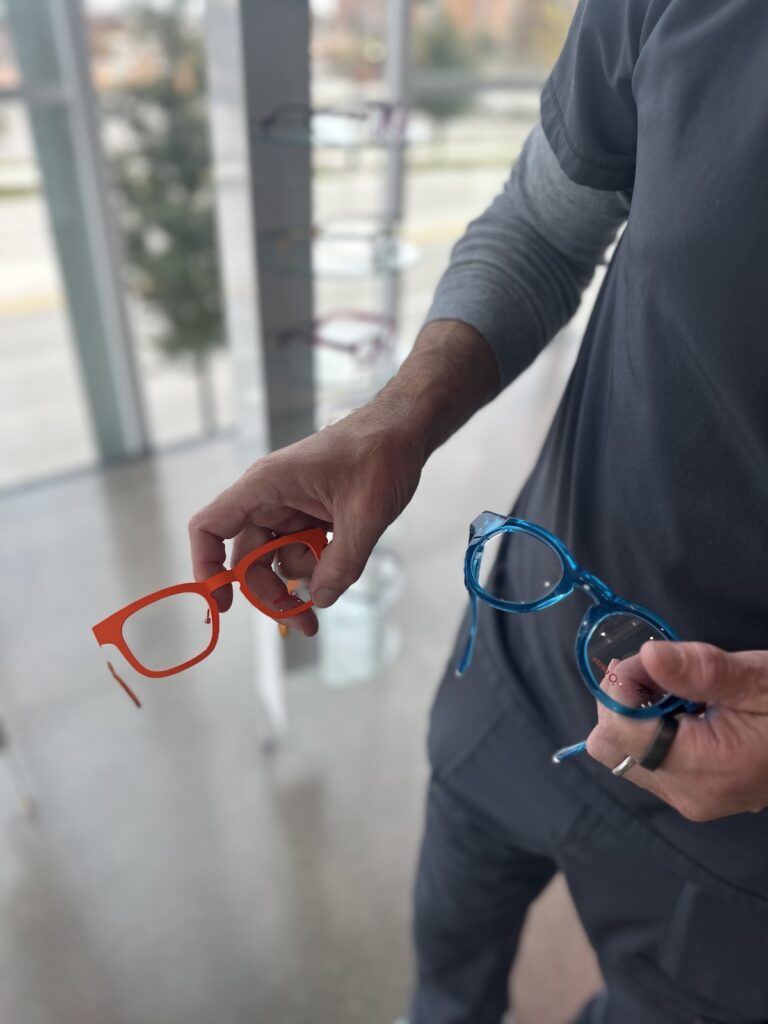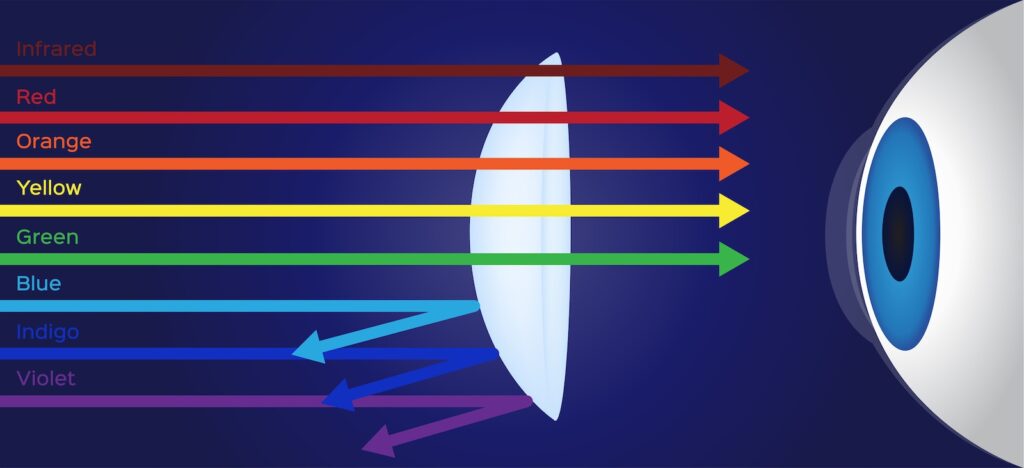In a world where digital screens dominate our daily lives, there’s a common concern: blue light. Many people find themselves worrying about how much blue light can affect them and whether or not there are ways to protect their eyes—like sunglasses. And it’s led to a popular question: can sunglasses block blue light?
Not all sunglasses are created equal. Many standard sunglasses aren’t designed to block blue light on their own, but you can incorporate a blue light filter into your lenses. If your sunglasses have lenses with a blue light filter or coating, they can help protect your eyes from blue light.
What Is Blue Light?
Blue light is a type of light with a short wavelength that produces a higher amount of energy. It’s primarily emitted by the sun and makes up about a third of all visible light. Our brains typically associate exposure to blue light with the need to be awake, so this particular type of light tends to cause us to be more awake, alert, and ready to go.
There’s a problem, though: blue light can also be emitted by digital screens. This has led to us being more exposed to blue light than we may have been in the past.
Blue light can be emitted by:
- Smartphones
- Tablets
- Computer monitors
- Television screens
- LED and fluorescent lights
- Digital signs and billboards
- Video game systems
Blue light can even be emitted by some overhead lights and everyday household appliances. Knowing where you may encounter blue light and limiting your use of those devices can help you avoid it throughout the day.
How Does Blue Light Affect Humans?
A lot of the blue light we’re exposed to comes from the sun, so our brains learned to associate blue light with the need to be awake, functioning, and productive. Blue light can directly affect your circadian rhythm too. When you’re exposed to it, your body wants to stay awake. When you aren’t, your body can prepare to sleep.
Too much blue light can disrupt our circadian rhythm and cause sleep problems because blue light suppresses the production of melatonin, a hormone that helps regulate sleep. So, while blue light from the sun helps regulate our sleep and wake cycles, frequent exposure to artificial blue light can have the opposite effect.
Melatonin levels usually start to rise in the evening and drop in the early morning hours to help us maintain a regular sleep schedule. But when we’re exposed to blue light from screens and devices, the effects can trick our bodies into believing it’s still daytime, resulting in reduced melatonin production.
Overexposure to blue light and exposure to blue light before bed can lead to the following problems:
- Difficulty falling asleep
- Finding it harder to stay asleep
- Poorer sleep quality
- Disrupted sleep patterns
Over time, the effects of blue light can even lead to long-term sleep deprivation—which can bring its own host of health issues. It’s crucial to try and regulate your exposure to blue light when you can, especially in the evenings.
Do Sunglasses Protect You From Blue Light?
If blue light mostly comes from the sun, can you just use sunglasses to avoid it? The answer can depend on your specific set of sunglasses.
Most of the time, sunglasses are designed to block UV radiation—a type of radiation from the sun that can damage your eyes over time. Overall, sunglasses aren’t designed to block blue light. They aim to protect your eyes from something else entirely.
However, some sunglasses can be customized with a blue light coating to add extra protection. The type of sunglasses you have and where you get them can affect your ability to add blue light protection.
What Do Sunglasses Protect You From?
Sunglasses specifically aim to block UV rays to prevent the effects ultraviolet radiation can cause over time. Exposure to too much UV radiation can increase your risk of:
- Cataracts
- Photokeratitis, a sunburn on the eye.
- Skin cancer around the eyelids, eyeball, and surrounding area
- Macular degeneration, a leading cause of vision loss in older adults.
- Damage to the retina
While standard sunglasses can be extremely effective, they don’t quite protect you from the blue light you’re exposed to inside. Remember: we’ve adapted to blue light from the sun. It’s unlikely that your normal exposure to the sun is causing any sleep problems or disturbances.
Instead, it can be helpful to try and protect yourself from blue light from man-made sources like computers and cell phones—but you might not want to wear sunglasses when you’re working at a computer or watching TV. Fortunately, you can also add blue light protection to non-tinted lenses with blue light glasses.
Blue Light Glasses
Blue light glasses are a type of specially designed eyewear that helps filter and block certain amounts of blue light. They come in both prescription and non-prescription options, and they can be an excellent way to avoid the effects of blue light.
Blue light glasses can be particularly helpful if:
- You like to watch TV before bed
- You like to spend time on your phone in the evening
- You spend most of your day near digital screens or other devices
- You work in a particularly bright environment
These glasses help prevent a certain amount of blue light from reaching your eyes, which can help maintain your natural circadian rhythm. This has made them an extremely popular option for people concerned about blue light exposure!
How to Limit Your Blue Light Exposure
In addition to wearing blue light glasses, there are a few ways you can further limit your blue light exposure. If you’re worried about how your screens and devices are affecting you, try the following strategies:
- Limit your screen time (especially before bed).
- Use night modes or blue light filtering modes on your devices if the option is available.
- Install a physical blue light filter on your devices with screens.
Remember, it’s all about balance. While blue light exposure from screens doesn’t usually severely damage your eyes, it can affect your sleep patterns and overall health over time.

Where Can You Get Blue Light Glasses?
We live in a technology-centric world, and we’re constantly exposed to blue light. So, our team at CHROMA modern Eyewear Eyecare offers a range of high-quality blue light glasses to protect your eyes. And we’ve got sunglasses as well, so you can protect your eyes no matter where you are. Book an appointment with us today, or check out our online selection!



